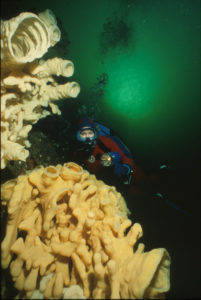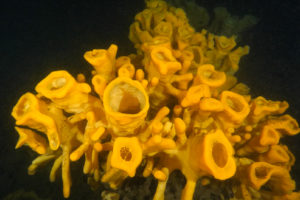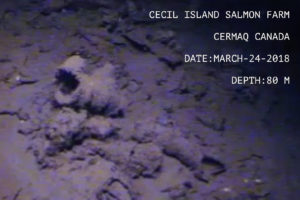Graduate student Nathan Grant, sponge expert Dr. Sally Leys, and others from the University of Alberta have conducted the first investigations on how reef-forming glass sponges respond to sediment in natural conditions. The results of the study raise concerning questions about the protection of these unique animals.

Photo by Dale Sanders
Since their discovery in 1987, glass sponge reefs have been thought of as the delicate treasure of BC’s coast. Glass sponge reefs were thought to have gone extinct 40 million years ago, and their discovery has been likened to finding a herd of dinosaurs. Glass sponge reefs are only found in BC and Alaska, forming intricate and towering formations deep on the ocean floor. These reefs form oases amidst the otherwise barren seafloor, attracting numerous species of rockfish, prawns, and sharks. Sadly, these vital ecosystems are vulnerable to damage by sedimentation.
Grant’s findings show glass sponge reefs may be even more sensitive to sedimentation than we had thought.
Glass sponges are filter feeders, getting food and oxygen by pumping water through their body, filtering out bacteria and other organic material. Sponges can filter up to 900 times their body volume every hour. When sediment is suspended in the water it can clog or damage the sponge’s delicate pumping system, while large grains could even block the incurrent openings.
Grant’s research shows that in response to suspended sediment, glass sponges begin to “cough”, or arrest the flow of water through their body. While this may protect the sponges from damage by the sediments, it reduces the amount of food and oxygen the sponge can obtain. Much like in humans, a lack of food or oxygen can lead to slower growth or even death in the glass sponge reefs.
Unfortunately, the danger of sedimentation is not only an academic concern, it is affecting reefs throughout BC. A recent video of a glass sponge reef in the Broughton Archipelago shows the effect of waste and sediment on a glass sponge reef located below an open net-pen salmon farm. In this instance, sediment turned a vibrant and diverse glass sponge reef into a desolate wasteland.

Healthy glass sponge reef. Photo by Tavish Campbell Photography

Smothered glass sponge reef. Photo by Tavish Campbell Photography
While glass sponge reefs form over thousands of years, sedimentation can rapidly destroy these delicate reefs. After seeing the video, Dr. Leys observed that the sensitive sponges “likely died soon after the first masses [of sediment] hit them”.
To make matters worse, Grant’s research observed coughing fits in glass sponges at levels of sedimentation far below what would be caused by activities such as bottom trawling. Grant concludes that sediment concentrations at the level generated by trawling activities could be catastrophic for glass sponge reefs. In the recent paper, Grant writes that their “data suggest that the sponges’ arrests and coughing behaviours would become frequent if not incessant, and smothering would be likely.”
This would almost certainly spell death for sponges caught in trawling sediment plumes.

Photos of glass sponge reef (A) before and (B) after sedimentation. Photos from Grant et al. MER with permission of the author.
The majority of glass sponge reefs in BC have no permanent protection and are vulnerable to destruction and sedimentation.
In 2017, after more than a decade of campaigning by CPAWS, the Hecate Strait and Queen Charlotte Sound Reefs were designated as a marine protected area, protecting them from damage and sedimentation. However, most glass sponge reefs in BC have no permanent protection and are at risk from sedimentation and other damage.
While processes are underway to protect additional reefs in BC, these protection measures may take years if not decades to implement, leaving glass sponge reefs vulnerable to damage in the interim. Due to the rare and fragile nature of glass sponges, a system for the immediate assessment and interim legislated protection of reefs as soon as they are discovered is absolutely necessary.
Without protection, these rare glass sponge reefs will continue to cough and choke on sediment, until they are eventually lost, perhaps forever.
